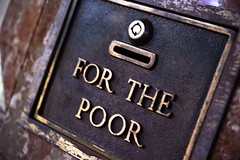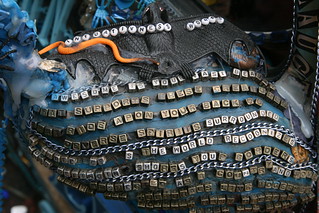I have this friend I'll call Jack. I've known Jack for more than twenty years. We're diametrically opposed on many topics. Over the years, we have developed a shorthand way of having entire hours of arguments—or "discussions," as we prefer to call them—without having to rehash the entire subject from beginning to end. We often know what the other is going to say before he says it.
It's a pretty comfortable place to be when you have a friend you can disagree with and have it not end the friendship, but actually make it stronger.
But that's not what I want to talk about. I want to talk about one of Jack's favorite laments.
Jack is—or used to be—a bit of a news junkie. A Republican who has morphed into a Libertarian over the years I've known him. For the entire time I've known him, no matter his political affiliation, he's complained about how liberally slanted the news media is.
Now, I tend to disagree with him, but that's because I'm in many ways a bleeding heart liberal with some Libertarian overlays. I have often quipped that it's funny how reality is usually described by non-liberals as liberally slanted.
Oh, the humor.
Jack laments the lack of truly objective reporting. Unbiased, just-the-facts-ma'am, bare
truth.
I've pointed out many times how this is simply not going to happen. We can't help but inject our writing and speech with words possessing connotations that indicate how we think about something.
1
Connotations
Many (most?) words have one or more
denotative meanings. These are the dictionary meanings of the words, themselves. But a lot of words also carry
connotative meanings, as well. These are meanings that aren't stated, but are implied by the words, usually in context.
2
It's not just our opinions that come through in our word choices. Words carry other connoted meanings, as well. To give an easy example, let's say there was a fire in an apartment building in a certain part of town and you're listening to a local newscaster tell about it.
"Today, a fire broke out in an apartment building in—"
The next words he speaks to describe the part of town the apartment building was in are going to convey not only the strictly informational geographic area of town in which the fire happened, but it will carry with it a
blortload of connotations. Everything has connotations.
Let's say the next words were "Little Five Points." Here in Atlanta, that will immediately conjure up an image of the "type of people"
3 the listener would expect to be in an apartment building in that section of town. We would see their wardrobe, their living spaces, the types of cars they drive, and could make assumptions about their lifestyles . . . it's all there encapsulated in the phrase "Little Five Points."
Let's say the next word had been "Dunwoody." This would conjure up a completely different image of a completely different "type of people" one would expect to be involved. With a whole different set of wardrobe, car, lifestyle, and living space assumptions.
If you talk to an Atlantan for any length of time, you'll likely hear the phrases "inside the perimeter" or "outside the perimeter." Interstate 285 completely encircles the city of Atlanta and effectively separates "metro" Atlanta from "the suburbs." Inside versus outside. But there are other connotations of the words "inside" and "outside," aren't there? I'm an insider if I live inside. I'm in the
real Atlanta. But outside, I'm just a suburbanite. I don't live
in Atlanta. I live in one of those lesser places that only touch Atlanta
proper. OR . . . Certain types of people live inside, and they can have it. I live
outside where a better class of people lives. (Disclaimer: I am neither espousing nor endorsing either of these opinions, but pointing out that they exist, although not for everyone in either location.)
Think about your own city. What parts of town would conjure up similar images for you? What's your "artsy/bohemian" district? Where do your "rich people" congregate? What's considered "downtown" and where do the "suburbs" start? Do you have suburbs with nicknames that immediately colors what people think of it? We have Chamblee which some people call Chambodia because of the high concentration of Asians that live there. The nickname "Chambodia" carries a plethora of connotations. (Not to mention being pretty insensitive and racist. I use it to illustrate my point.)
So, right away, anything that comes after the phrase above would have connotations. We cannot escape it unless we are new to the area and don't know what is implied. But that's temporary at best.
Word Choices
One of my favorite "jokes" I've heard over the years was, I believe, from Saturday Night Live back in its heyday. You know, when it was funny.
4 The fake newscast had a fake story that went like this.
Today in Singapore, two loaded 747s collided in midair, killing 573 people. But that's okay, because there were no Americans aboard.
They were lampooning a particular style of story I used to hear a lot, but can't say I've seen recently. News anchors would always have a story of a plane crash—or volcano eruption, train derailment, bus going over an embankment, earthquake, tsunami, etc.—and they would say something like, "two hundred seven people were killed. Eight of them were American citizens." The implication was that the only eight people who
mattered were the eight Americans. In that case, it wasn't a connotation but a
denotation: they came right out and just
said it. Is that what they
meant? Probably not. But it certainly stuck in
my head, and it was prevalent enough that SNL lampooned it. And they stopped doing it, as far as I can tell.
But what about subtle word choices? That one had all the subtlety of . . . well, two planes colliding.
Bare facts: John Smith was found guilty of the rapes and murders of 17 young women over the course of 5 years, although he pleaded not-guilty during his trial. He is currently serving a life sentence, but his parole hearing is about to come up.
Reporter 1: "Some of you may remember this man, John Smith, who twelve years ago began a five-year reign of terror over the Atlanta community with the brutal rapes and murders of seventeen innocent victims, all young women. Channel 21 has an exclusive interview with him on the eve of his potential release onto an unsuspecting Atlanta."
Reporter 2: "Coming up, Channel 17 has an exclusive interview with this man, John Smith, who is currently serving a life sentence for the alleged rapes and murders of seventeen young women over a five-year period. His parole hearings are tomorrow, and we wanted to get his thoughts."
Each version gives the facts, but you may have noticed an ever-so-slight </sarcasm> bias in the first one. The reporter interjects opinion using words like 'reign of terror,' 'brutal,' and 'unsuspecting.' Also, by bringing up the word 'innocent' in relation to the victims, the implication of 'guilty' is laid out there for Mr. Smith. This reporter also does this by directly stating that he
committed the acts, when in reality, he was only found guilty of having done so, but maintained his innocence. Those are the only "charged" phrases, but
what phrases! With just a few well-placed phrases, the reporter has told us what we are supposed to think about this story. You would likely be more inclined to think John Smith guilty and hate him after listening to the first reporter. The second reporter doesn't do that, so we are free to think what we want to think. (Or are we?)
The first reporter also does something subtle with the opening statement, "Some of you may remember . . .". By saying that, the reporter is gently chastising anyone who could possibly
forget what this man
did to all those
victims. S/he is also subtly giving you a pat on the back if you are one of the smart ones who remember. "Oh, yes, I
do remember that despicable, low-life murderer!"
A lot of pundits and talking heads use these tactics. Watch Nancy Grace, Rachel Maddow, Bill O'Reilly, Glenn Beck, or Keith Olbermann for any length of time, and you'll see them manipulating how you think about the facts they're presenting using words both subtle and blatant. Hell, Limbaugh (and others) invents words. "Feminazis," anyone?
Okay, so those still weren't terribly subtle. How about something
more subtle?
Here's a random headline I took straight from a news website on the day I happened to be typing this particular paragraph. Well, not really random. I carefully chose it from dozens because it can be used to illustrate my point. :) But by telling you it was random, I was leading you to believe that there might have been dozens to choose from, when in reality, I had to search very hard to find one I could play with.
5
Dr. Oz Slammed by the FDA Over Apple Juice Arsenic Investigation
Now, let's rewrite that a few times to change your reaction without changing the information.
Dr. Oz Criticized by the FDA Over Apple Juice Arsenic Findings
Dr. Oz Chastised by the FDA Over Apple Juice Arsenic Allegations
Dr. Oz Scolded by the FDA Over Apple Juice Arsenic Claims
They all say
basically the same thing, right? But each change in the two words I altered changes the tone of the headline. "Slammed" implies a hard punch to the face, whereas "Scolded" suggests them holding up one finger and shaking it while saying "Naughty, naughty!" In the same way, "Investigations" implies that there was foul play, whereas "claims" suggests that the whole thing was of no importance. To me, the "criticized" and "findings" one is the most neutral. What do you think?
When it Goes Awry
It used to amuse me greatly when I'd peruse
6 my friends page on LiveJournal the day after a political speech aired the previous night. I would often read three posts back-to-back from different friends with different political affiliations. One would be praising what the politician said, another would be blasting the same speech, and a third would be somewhere in between. The funny thing to me was that each one would use the same quotes; they'd just interpret them through a different set of filters to glean completely different meanings. Words occasionally mean different things to different people, and there's not a thing you can do about it other than trying to explain your meaning, which can get tedious.
Of course, I
had to
mention my amusement on my own journal. It was just before the 2004 elections, and I opened this way.
I haven't watched any of the debates. I'll just get that out of the way up front. I'm not interested in blah-blah about how horrible a person this makes me, so keep it to yourselves.
That having been said, I've found it amusing to read other peoples' critiques of what went on during the debates. You know, who won them, how well each candidate came across, etc.
This angered one of my friends who read my tone as mocking. Which it may have been, at some level, but I certainly didn't consciously attempt to mock him or anyone else. It really did just amuse me that three people could hear the
same speeches and get such different things from them. He reacted to my (perceived) snarky tone rather than the point I was trying to make. I communicated badly, because I allowed something else to show through (I'll explain what shortly). Here's what my friend said in response.
Ya know what?
No, you dont get to scold people who watched the debates, and pontificate about how stupid we all are, when you have no interest in the process. At least, not without some mention of how absurd this position is, in itself. How incredibly arrogant to pass judgement on people trying to see some good in the world, trying make the process work and talk about it.
I'll defend your right to say whatever you like, that's American, but that doesnt mean I agree with it. And I dont. They're completely different scenarios on dozens of points.
Laugh at someone else—someone who doesnt actually give a damn.
Did he have a point? Eh, I don't know. I can see a little 'you humans amuse me so very much' in my tone, but . . . well, humans
do amuse me! I wasn't intentionally calling
anyone stupid (I in fact never used the word 'stupid' at all). But he read something into my words. I
was a little defensive with the 'I'm not interested in blah-blah' comment. (And if you read my first comment, you'll see the fledgling beginnings of this very post. :)
And looking back on the incident from 7 years later, I think that was partially because of Jack. :) Jack has been on me for
decades because I have a high apathy quotient toward politics in general and elections in particular. I guess I just view the world more cynically than he does, but he berates me about not caring about the future of America, baseball, mom, apple pie, and Chevrolet (you should imagine Lee Greenwood's "Proud to be an American" playing under this; I always do). I do care, of course. But it was the frustration of the argument
I imagined in my head that Jack and I would have when we talked that I was responding to when I penned the "blah-blah" part. My friend who responded up there titled his reply "Blah-blah?" It was that choice of words that apparently got under his skin. My dismissal of his entire opinion summed up in only eight letters and a punctuation mark.
7
The first time my friend Jack and I got into a discussion about anything remotely political, we'd been friends for . . . maybe a year or two. He called me one night and had me turn on the TV to see something he was watching. (This was in the days before IM. We used to have these things in our homes called "telephones" that were actually
wired into the wall and you had to stay in one place while talking to someone. Some of you may have seen them in museums or perhaps on reruns of ancient television shows on Nickelodeon.)
Now, I stress here that he didn't give me any cues as to whether I was supposed to be amused, appalled, angered, or whatever by what I was about to see. Had I been in the same room with him, I might have been able to use his facial expression or body posture to figure it out, but with just the neutral words,
I didn't know how he wanted me to take it. So, without any cues, I had only my own background as a filter.
It was Rush Limbaugh's show, back before he let his own unfiltered speech get him in trouble several times. This particular night, he was comparing some politician—I neither remember who nor do I care—to a gorilla. The gorilla clips were displayed in kind of a picture-in-picture manner that he used to use a lot. The gorilla clips were obnoxious. Aggressive, teeth bared, roaring, staring . . . the very epitome of a raving beast who is about to rip your head off.
Which is not what gorillas typically are. I responded in instant anger. "That idiot! Gorillas are
nothing like that! He's portraying them as savage beasts when in reality they're gentle vegetarians!" (I probably didn't say it all grammatically correct like that, but dis
my blog; I get to look better than I was. :)
I didn't care a whit what Limbaugh was saying about whomever he was lambasting at the moment. What disgusted me was his blatant, manipulative use of the images of gorillas behaving aggressively—which they only do when threatened or when trying to intimidate a rival male gorilla—and—I thought at the time—implying that all gorillas are like this all the time. Misleading his audience deliberately to make whatever point he was attempting to make.
I have hated Limbaugh's guts out since then, even though I occasionally find myself agreeing with certain of his opinions from time to time.
8 And certainly not solely because of the gorilla incident. I find him reprehensible. But it occurs to me only now as I type this that Limbaugh was probably using the gorilla footage purposefully to mock the empty posturing of the politician he was making fun of. Gorillas tend to look big, threatening, and scary, but they often rush at an opponent as a feint, then stop and back off to do it all again. It's all intimidation and . . . well, posturing. (Probably) Exactly like the politician in question. And it was, in fact, probably a valid point. Hmm.
Anyway . . .
Jack didn't get my furious reaction. I honestly thought he'd be as appalled as I was. (Another post idea I've been playing with is how we all project ourselves onto others.) But he thought it was funny how Limbaugh was making fun of whatever Democrat he was making fun of that night. He wanted to share the amusement with me. My extremely angry reaction surprised him.
This small incident colored my view of Jack for a while. He (unwittingly) had to overcome my initial political impression of him that was formed in the 30-second clip he had me watch. Without even realizing I was doing it, every time I heard Jack express his political opinions, I'd push back against whatever Jack said, even if I sort of agreed with him. I called it "playing devil's advocate" for a long time.
There is no such thing as an unbiased story, be it fiction or nonfiction. Our subtle word choices—or not so subtle—betray our opinions no matter how hard we might try not to. And sometimes, when those words are not there, you're not giving your reader/listener
enough information to get more than just the bare facts, if you want to communicate more.
Convincing Speech
A couple of years ago, Bad Astronomer Dr. Phil Plait was the keynote speaker at The Amazing Meeting in Las Vegas, Nevada. His speech caused quite a stir. It was entitled, "Don't Be a Dick."
His message was simple: if you want to convince people that they are wrong and you are right—or at least have a reasonable position—the way to do that should
never include calling them stupid or belittling their intelligence.
Yes, that simple. But it caused a splash in the skeptical community. Plait called out several big-name skeptics by name. Dawkins, Myers, Harris, and Christopher Hitchens. Their styles are/were in-your-face and confrontational. Dawkins has publicly stated that he considers bringing a child up in the religion of the parents a form of child abuse. They call a spade a spade—or perhaps it's better to say that they call a perceived idiot an idiot—when they see one.
How many times in your life has someone gotten in your face and yelled at you that you're an idiot and changed your opinion? Go on, try to remember. Every day, right?
Conclusion
I started writing this post back in May of 2011. It has taken me the better part of
nine months to get it to the point where I will consider posting it. Why? Because I kept thinking of one more point. I kept finding places where I either unwittingly used a loaded word or phrase or could purposefully use one to illustrate a point.
Is this post perfect? No. Bias abounds. Because I believe it is very nearly impossible to write without bias and still have what you're writing mean anything to anyone.
And I'm still likely to piss someone off with something I've said. Both Jack and the friend who took me to task over my "blah-blah" wording are friends of mine on Facebook, where this post will show up. Will they see it and recognize themselves? Probably. I can only hope they realize I'm not trying to belittle or scold them with this post, but to point out my
own mistakes. In Jack's case, he was also the inspiration to write this rant. :)
My hope in posting this—for the few people who will read a 4100-word rant—is that you—and I—will think about our word choices more when we’re trying to write something persuasive. Or critical. And when reading other people’s opinions, try to overlook the manipulative language that they either accidentally let creep in or purposefully chose and think about our responses. Are they emotional or intellectual? Are we basing our response on the facts or the wording used to convey them? Are our words going to be received the way we intend for them to? Will the way we word our message obscure or overshadow our intended message?
- Exercise: How did my use of the word 'simply' affect how you feel about what I said? What if I'd said "likely" or "probably"? Or how about "demonstrably" or left it out altogether? I said that I've pointed out "many times," which probably made what I said have a kind of eye-rolling sound, as though it's something I wish we could move past. What if I'd chosen to say that I've pointed it out "over and over and over" or just left it out? What impression would you get from the same basic sentence, imparting the same information, but with slightly different word choices with slightly different connotations? Speaking of connotations . . .
- Or sometimes by the means in which the words are delivered. Exercise: When you're reading a blog post, do you remember that the presence of the post on someone's blog connotes that everything said is in that blogger's opinion? I think sometimes—all too often, perhaps—we all forget this, including those of us who write the blogs. :)
- Why did I put that in quotes?
- How many of you think I'm talking about the 70s? 80s? 90s? I thought I was conveying a specific time period; you may have thought the same thing, but we could be thinking of completely different decades. Have we communicated, even though I gave you just the facts as I see them?
- Now that you know it wasn't random, how did your feelings toward the headline I'm about to present change, even before you see it?
- Exercise: What does 'peruse' imply for you? If you're a native speaker of American English, probably something the word doesn't mean. I chose it on purpose to convey both meanings: the connotative one and the denotative one. "Peruse" means to examine or consider with attention and in detail, but in everyday usage, it has come to imply something much more casual, like "scan" or "skim." So I've just told everyone reading this the same exact thing, but a percentage of you interpreted it denotatively and a percentage went with the connotative meaning. And they're polar opposites. Which did I really mean? Have we communicated effectively?
- Exercise: Do you see that word 'just' in the third sentence in this paragraph? "Just" used in this manner trivializes—with one word—someone else's opinion. "Oh, he's just a liberal. [unspoken but implied: . . . therefore, his opinion doesn't matter.]" We hear it all the time in software development: "Can you just add another button to the app that [does x]?" "Just" belittles the amount of work it takes to do that. I happened to notice my use of it in one of the dozens of times I edited this post before posting it . . . and thought I'd leave it there to make a point. And while I'm making that point, the word 'berates' is a little belittling, too, now that I think about it.
- Sheesh. Did you see how I used the words "occasionally" and "find myself" and "certain" and "from time to time" to push myself as far back as humanly possible from a position of actually agreeing with Limbaugh? And then I used "actually" the second time to further distance myself. Clearly, I don't like Limbaugh, and it is distasteful for me to "be forced to" agree with him. Did you get that loud and clear, or should I state it more openly? :)














